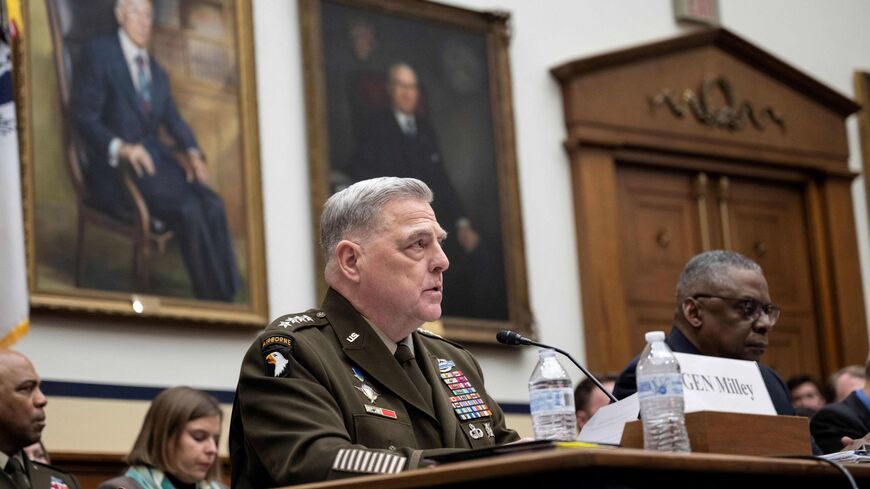WASHINGTON — The Pentagon’s top general publicly advocated a more forceful US response targeting the Quds Force of Iran’s Islamic Revolutionary Guard Corps after a spate of attacks on US bases in Syria last week.
US Army Gen. Mark Milley told members of Congress on Tuesday that the US should target the Quds Force “harshly” in order to deter future rocket and drone attacks by Iran-backed militias on US troops in Syria and Iraq.
“Some of these groups are much more aggressive than others,” Milley told members of the Senate’s Armed Services committee during a hearing.
“The Iranian government is a complex, large organization, and the Supreme Leader [Ali Khamenei] may or may not be making every single decision,” the top general said.
“We do know that the Iranian Revolutionary Guard [Corps], and specifically their Quds Force — which is a designated terrorist organization — that group there is what we need to be targeting, and targeting them very harshly over time, and that's exactly what we plan on doing.”
The context: Milley’s comments came in response to a question from Sen. Jacky Rosen (D-Nev.) about what steps the US can take to proactively deter future attacks.
Two Iranian-made drones slammed into a US base in northeast Syria’s Hasakah province last week, killing a contractor and wounding five other Americans, including four US troops.
The incident set off yet another deadly tit-for-tat between the US military and Iran-backed militias in Syria, renewing questions among lawmakers on Capitol Hill over the White House’s legal authorities to strike Tehran’s proxies.
President Biden approved retaliatory airstrikes late last week against facilities used by IRGC-backed militias in Syria’s eastern Deir Ezzor province in response to the Hasakah drone attack, citing presidential war powers under Article II of the US Constitution.
US warplanes bombed buildings that “included a headquarters element” and “storage sites where key munitions were being stored and other capabilities were being developed,” Pentagon chief Lloyd Austin told Senate lawmakers in the hearing alongside Milley on Tuesday.
“There were people in those facilities,” Austin confirmed. A senior US military official told Al-Monitor on Wednesday that the Pentagon’s latest estimate was that eight members of Iran-backed Syrian militias had been killed in the US strikes.
US troops at bases in northeast Syria were targeted by at least five additional barrages of rockets and drones late last week in the aftermath of Washington’s response, resulting in the injury of an additional US soldier, but the White House refrained from green-lighting further airstrikes.
President Biden affirmed during a trip to Canada last week that his government does not seek conflict with Iran, but that warned that American forces would “act forcefully” to protect US citizens.
“We’re not going to stop,” Biden replied when asked whether his administration should impose greater costs on Iran for such attacks.
Why it matters: Milley’s comments signal an escalation in rhetoric, but it remains to be seen whether they are indicative of actual US policy.
The top general — who as chairman of the Joint Chiefs of Staff serves as Biden’s top military adviser but is not in the chain of command — successfully lobbied the administration last year not to rescind a Trump-era designation of the the IRGC Quds Force as a terrorist organization.
But Milley has walked back previous comments on Iran and Russia's war in Ukraine after speaking out of sync with the administration's intended messaging.
It remained unclear what methods he meant the US should use to target the Quds Force, but a military official speaking on the condition of anonymity said the top general's comments could be interpreted to include both lethal and non-lethal actions.
Joseph Holstead, a spokesperson for Milley’s office, told Al-Monitor on Wednesday, “The chairman’s statement speaks for itself.” A spokesperson for the White House’s National Security Council did not immediately respond to Al-Monitor’s request for comment.
Deterrence and denial: Last week’s deadly exchange marked the fourth time Biden has authorized retaliatory airstrikes against Iran-backed militia sites since taking office in January 2021. Since then, Iran-backed groups have launched some 83 attacks — mostly consisting of small rocket and drone barrages — towards US troop positions in the Middle East, raising new doubts whether the current US approach is working.
The top commander of US forces in the Middle East, US Army Gen. Michael “Erik” Kurilla, told House lawmakers earlier this month that Iran and its proxies in the region were undeterred.
Quds Force-backed militias in Syria “have behaved increasingly independently over time, particularly since the targeted killing of Qassem Soleimani,” said Jonathan Lord, director of the Middle East security program at the Center for a New American Security, a Washington-based think tank.
“His replacement, Ismail Ghani, has not demonstrated the same ability to constrain them. It’s become increasingly difficult to know whether any specific attack by the militias in Syria is the result of them acting independently or with direction from Tehran,” Lord said
In contrast to the Trump administration — which demanded the Pentagon provide plans to strike Iranian territory and assassinated Quds Force commander Qassem Soleimani in early 2020 — the Biden administration has until recently opted for a subtler approach to arrest the cycle of violence while preventing escalation into open conflict.
Earlier in his exchange with Sen. Rosen on Tuesday, Milley emphasized the US forces have relied on non-lethal means to thwart such attacks, including employing air defenses and working with local US-friendly forces in Syria and Iraq.
The top general, however, also hinted at the use of clandestine options. “We have actually in the past done some things to those groups that are not necessarily on the front page of the paper,” Milley explained. “So there are activities that are occurring that do act as a proactive measure.”
“When we respond, we want to make sure … that we are going after the element that's responsible,” Austin told lawmakers during the hearing. “It takes a little time to develop attribution.”
Third wheel: Pentagon officials have grown increasingly wary in recent months that the ripple effects of Russia’s war in Ukraine could shift the tense balance between the IRGC's proxies in Syria and Israel’s covert campaign targeting them — with US troops potentially caught in the middle.
Biden administration officials insist the remaining 900 American troops in Syria are only there to fight the remnants of the Islamic State, but the US presence also restricts the geographic footprint of Iran-backed groups.
Tehran’s proxies have launched barrages targeting US positions in apparent response to Israeli airstrikes in the past, as Tel Aviv seeks to beat back the IRGC’s foothold on Israel’s northeastern flank.
Last week’s drone attack on the US base at Rmelan, in Syria’s Hasakah province, came less than a week after renewed Israeli strikes on Iran-linked targets at Syria’s Aleppo airport.
Iranian media reported that a supposed group calling itself Liwa al-Ghalibun, or “Brigade of the Victors,” claimed responsibility for last week’s drone barrage. Similarly unknown groups appearing to represent the so-called Iran-backed resistance have claimed credit on social media for previous attacks, leading analysts to suspect a false front of deniability for the IRGC.
Milley on Tuesday advocated putting various Iran-backed groups in Syria and Iraq on notice to deter further attacks. "The various Shia militia groups — we know who they are — [we should be] letting them know that we will respond affirmatively and forcefully if they attack our troops," he said.
Iran’s Foreign Ministry on Tuesday appeared to distance itself from the drone attack after previously warning last week that US troops would be targeted if Iranian personnel came under attack in Syria.
"In my view, Iran's strategic objective is to drive the United States out of both Iraq and Syria," Milley told House lawmakers on Wednesday. The US intelligence community continues to believe that the IRGC aims to solidify its arc of influence over Shia proxy militias stretching across Iraq and Syria to Lebanon, the top general added.
"Their archenemy obviously is Israel, and they [Iran] want to be the dominant power in the region," Milley stated.
Despite the risk, Biden administration officials continue to say both publicly and privately that the relatively small contingent of American troops will not leave Syria until the threat posed by the Islamic State group is eliminated.
US officials remain vague about what end state they envision for the mission in Syria, if any, but have said it can't be achieved without first returning thousands of foreign IS members and their relatives back to their home countries from indefinite detention in facilities spread across Syria's northeast.
In the meantime, American troops have been experimenting with new methods to knock down the projectiles frequently launched by Iran's proxies.
Milley, who visited Syria earlier this month to inspect US troop security measures, told lawmakers, “They have, we think, adequate force protection in terms of rocket and missile defenses.”







